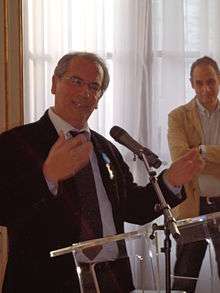Stavros Katsanevas
Stavros Katsanevas is professor (Exceptional Class) at the Université Paris VII Denis Diderot, director of the AstroParticle and Cosmology (APC) laboratory and chairman of the Astroparticle Physics European Consortium (APPEC). In 2000, he received for his work on supersymmetry the Physics Prize from the Academy of Athens. In 2011, he was awarded the Ordre National du Merite.
Stavros Katsanevas | |
|---|---|
 | |
| Born | 1953 (age 66–67) |
| Nationality | French, Greek |
| Known for | Supersymmetry / Astroparticle Physics |
| Awards | Chevalier de l’Ordre National du Merite (2011), an Order of State awarded by the President of the French Republic |
| Scientific career | |
| Fields | Physics |
| Institutions | IN2P3/CNRS |
Education and work
Katsanevas was born in Athens, Greece, where he did his undergraduate studies in physics at the University of Athens. He obtained a doctorate "of 3rd cycle" from University of Paris XI and a PhD from the University of Athens, where he was later a lecturer and an associate professor (1982–1996). He has spent three years as a postdoc at the Fermi National Laboratory. He also worked at CERN, as a CERN Fellow, CERN Associate Scientist and as CERN Corresponding fellow. He then moved as a professor to France to the Université de Lyon I Claude Bernard. In 2002, he became Deputy Scientific Director of IN2P3/CNRS for the field of Neutrino and Astroparticle Physics (until 2012), transferring at the same time to the Université Paris VII Denis Diderot, where he is now Professor Exceptional Class. Since 2018, he is director of the European Gravitational Observatory near Pisa.[1]
Since 2000, Katsanevas held the following positions:
- Director of the CNRS interdisciplinary program "Astroparticle Physics" (2002–2010)
- Director of the Astroparticle and Cosmology Laboratory of CNRS / IN2P3 (2014 - 2017)
- Coordinator of the EU funded agency consortium[2] «AStroparticle Physics European Research Area NETwork (ASPERA)» (from 2006 to 2009 and deputy coordinator since)
- Principal Investigator (in a total of 15) of the Institute for the Physics and Mathematics of the Universe at Tokyo (2007-today)[3]
- President of the council of the European Gravitational Observatory (EGO) host of the VIRGO gravitational wave antenna (2003–2008 and 2011-2017)
- Chairman of the Astroparticle Physics European Consortium (APPEC) [4]
He has also been a member of the following committees:
- Steering Committee of Astroparticle Physics European Coordination (ApPEC)(2002-today)
- AstroParticle Physics International Forum (APIF) of OECD (2010-today)
- European Strategy Group as representative of APPEC (2011–2013)
- CERN Super Proton Synchrotron (SPS) Committee (SPSC) (2008–2010)
- PaNAGIC (Particle and Nuclear Astrophysics and Gravitation International Committee) astroparticle coordination - IUPAP working group (2005-today)
- Evaluation Committee for Space Research and Exploration and Inter-Organism Committee of CNES (National Centre of Space Studies, France) (2002-today)
- Scientific council (chairman) of IFAE/Barcelona (2009-today)
Research interests
- Theory of strong interactions (Quantum Chromodynamics, QCD) (1977–1986)
- Search and discovery of new particle resonances including charm quarks, photoproduction experiment WA4 at CERN (1977-1979)
- Tests of QCD through the study of DRELL-Yan pairs and J/y resonances in nuclear targets with antiproton and pion beams, experiment E537 at Fermilab (1979-1982)
- Search for quark-gluon plasma transition, experiment R807-808 at CERN (1983-1986)
- Standard model of weak and electromagnetic interactions (1986–2000)
- Study of the standard model of electro-weak interactions and supersymmetry: experiment DELPHI of the Large Electron Positron (LEP) collider.
- Phenomenological studies of supersymmetry: Monte Carlo generator SUSYGEN and computing of higher order cross sections
- Neutrino and Astroparticle Physics (1983–2002)
- Interdisciplinary studies
- DACQ for Positron Emitting Tomography (PET) Scanners (co-holder of a patent)
- Innovative high sensibility photodetectors with high space and time resolution
See also
- Astroparticle Physics
- IN2P3
- Aspera European Astroparticle Network
- Supersymmetry
References
- "Change at the top of the European Gravitational Observatory". Retrieved 27 July 2018.
- "Aspera". Archived from the original on 16 November 2014. Retrieved 12 December 2011.
- "Stavros Katsanevas". Archived from the original on 26 April 2012. Retrieved 12 December 2011.
- "APPEC". Archived from the original on 19 January 2012. Retrieved 12 December 2011.